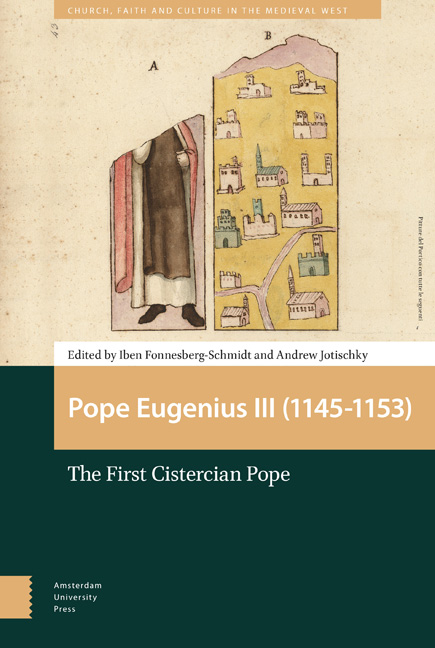Book contents
- Frontmatter
- Contents
- Preface
- Abbreviations
- Maps and Figures
- Introduction
- 1 ‘Justinian’s Laws, not the Lord’s’: Eugenius III and the Learned laws
- 2 Curial Politics and Papal Power : Eugenius III, the Curia, and Contemporary Theological Controversy
- 3 The Cistercians, Eugenius III, and the Disputed York Election
- 4 Eugenius III and the Crusades to the East
- 5 Eugenius III and the Northern Crusade
- 6 The Benefits of Exile
- 7 Eugenius III and France: the Protected Protector
- 8 A Golden Rose and the Deaf Asp that Stoppeth her Ears: Eugenius III and Spain
- 9 Eugenius III and the Roman Commune
- 10 Eugenius III Reclaims the Patrimony of St Peter
- 11 Eugenius III’s Privileges to Cistercian Houses
- 12 Eugenius III at Cîteaux, 1147
- 13 Eugenius III and the Church in the Crusader States
- Index
6 - The Benefits of Exile
Published online by Cambridge University Press: 22 December 2020
- Frontmatter
- Contents
- Preface
- Abbreviations
- Maps and Figures
- Introduction
- 1 ‘Justinian’s Laws, not the Lord’s’: Eugenius III and the Learned laws
- 2 Curial Politics and Papal Power : Eugenius III, the Curia, and Contemporary Theological Controversy
- 3 The Cistercians, Eugenius III, and the Disputed York Election
- 4 Eugenius III and the Crusades to the East
- 5 Eugenius III and the Northern Crusade
- 6 The Benefits of Exile
- 7 Eugenius III and France: the Protected Protector
- 8 A Golden Rose and the Deaf Asp that Stoppeth her Ears: Eugenius III and Spain
- 9 Eugenius III and the Roman Commune
- 10 Eugenius III Reclaims the Patrimony of St Peter
- 11 Eugenius III’s Privileges to Cistercian Houses
- 12 Eugenius III at Cîteaux, 1147
- 13 Eugenius III and the Church in the Crusader States
- Index
Summary
Abstract
Eugenius III's itineration through France, Germany, and Switzerland in 1147–8 brought the panoply of the papacy to northern regions, allowing large numbers of petitioners or litigants to approach the travelling Curia in person and experience papal jurisdiction first hand. More importantly it brought the papacy to ordinary men and women. Special features of this study are eye-witness accounts of spectacular and memorable visits to Reims, Châlonssur- Marne, Verdun, and Trier. One witness described dancing in the streets of Verdun, where Eugenius consecrated the cathedral church and translated the relics of St Vanne, another could scarcely contain his excitement at the papal residence in the imperial city of Trier, while Châlons-sur-Marne employed a public notary to record the papal visit for posterity.
Keywords: Eugenius III; travels in France; Germany; Switzerland; visits to Besançon; Châlons-sur-Marne; Cîteaux; Cluny; Paris; Reims; Saint- Maurice d’Agaune; Trier; Verdun
When at the end of 1146 Eugenius III and his advisers decided to take the road to France, there was no lack of precedent for such a journey. Setting aside the somewhat ambiguous legacy of the five popes who had travelled to Frankish lands in Carolingian times, they could look to the much more positive examples of the reform popes from the mid-eleventh century onwards. In 1049, Leo IX had interrupted what was primarily a reforming tour of northern Germany under the patronage of the Emperor Henry III, to make an important excursion to Reims. There, on 1 October, he translated the relics of St Rémi and consecrated the cathedral, following which he presided at a council where, ‘with the advice of our fellow bishops and the assent and approval of the clergy and people, an enormous number of whom had flooded in to celebrate such an important consecration’, he issued ‘many [decrees] necessary for the Christian religion’. The Frenchborn Urban II in 1095–6 and the Burgundian-born Calixtus II in 1119–20 went even further, and turned the crisis of the schisms which confronted them into opportunities to establish the legitimacy of their papacy against imperially supported rivals. Not only were they enthusiastically received by the French monarchy, nobility, and clergy, but they presided at councils which carried forward the reform programme begun by Leo and confirmed papal leadership of the Church.
- Type
- Chapter
- Information
- Pope Eugenius III (1145–1153)The First Cistercian Pope, pp. 171 - 196Publisher: Amsterdam University PressPrint publication year: 2018



